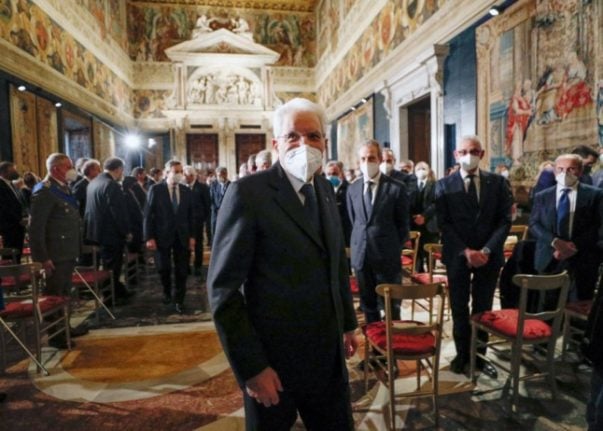“This is a fresh, unexpected call for a commitment which I cannot – and will not – back away from,” the 80-year-old said, stressing the challenges Italy faces in the wake of the coronavirus pandemic.
His inauguration in parliament was marked by wild bursts of applause from lawmakers, who re-elected him by a large majority in the eighth round of voting after parties failed to agree on any other candidate.
The only other serious contender for the job – Prime Minister Mario Draghi – was needed at the head of government to keep Rome on track with major reforms to the tax and justice systems and public sector.
Mattarella said he stepped up to end the “profound political uncertainty and tensions” which could have “jeopardised… the prospects for relaunching” the Italian economy.
PROFILE: President Mattarella, the reluctant hero in Italy’s crisis
These have been “troubled times for everyone, including me,” he told the lower Chamber of Deputies, which was decked out in red drapes and 21 vast Italian flags.
The cannons on the Gianicolo hill overlooking Rome fired a 21-gun salute and the bronze bell at the lower house rang out as Mattarella took the oath.

In his speech, Mattarella sounded a warning note over geopolitical tensions, urging a “more just, more modern Italy” to be “intensely linked to the friendly peoples that surround us”.
“We cannot accept that… the wind of confrontation is once again rising in a continent that has known the tragedies of the First and Second World Wars,” he said in a nod to fears that Russia might invade Ukraine.
He called those present to increase efforts to rebuild Italy after the devastation of Covid-19, which hit the country hard and has killed over 147,000 people.
Mattarella’s re-election on Saturday was hailed as having temporarily averted a political disaster but it also laid bare deep fractures within the ruling broad coalition government.
Draghi, brought in by Mattarella last year, has been racing to ensure Italy qualifies for funds from the EU’s post-pandemic recovery scheme amounting to almost 200 billion euros ($225 billion).
The deadlock over the presidential candidate risked derailing those reforms, and fears remain that one or another of the parties in the coalition could pull out causing the government to implode.
The presidential post in Italy is largely a ceremonial job, but it plays a key role during a political crisis, and experts said Mattarella looked set to have his work cut out.



 Please whitelist us to continue reading.
Please whitelist us to continue reading.
He is a steadybhand at the helm of Italian politics.
He is a steady hand at the helm of Italian politics.
He is steady gand to have at the helm of Italian politics.
Steady hand at the helm of Italian politics.
He is a steady hand at the hrlm of Italian politics.
He will be steady at the helm of Italian politics.
He is a steady hand at the helm of Italian politics,